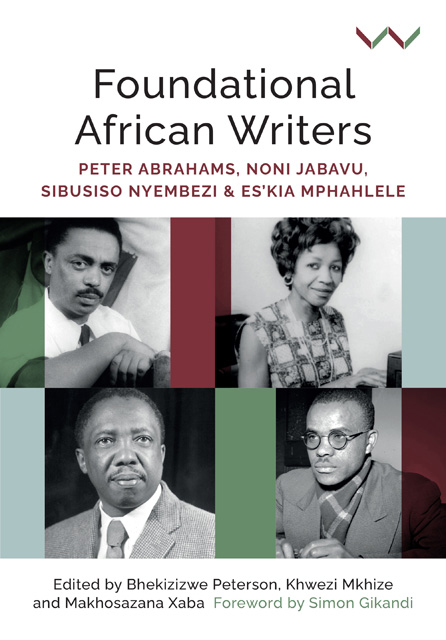Book contents
- Frontmatter
- Contents
- List of illustrations
- Foreword
- Acknowledgements
- Tribute to Professor Bhekizizwe Peterson
- Introduction
- Part I Remapping and Rereading African Literature and Cultural Production
- Part II South Africa and Fugitive Imaginaries
- Part III In the Eye of the Short Century: Diaspora and Pan-Africanism Reconsidered
- Contributors
- Index
17 - Anticolonial Romance and Tragedy in Peter Abrahams’ A Wreath For Udomo
Published online by Cambridge University Press: 01 September 2022
- Frontmatter
- Contents
- List of illustrations
- Foreword
- Acknowledgements
- Tribute to Professor Bhekizizwe Peterson
- Introduction
- Part I Remapping and Rereading African Literature and Cultural Production
- Part II South Africa and Fugitive Imaginaries
- Part III In the Eye of the Short Century: Diaspora and Pan-Africanism Reconsidered
- Contributors
- Index
Summary
In his memoir, The Coyaba Chronicles, Peter Abrahams describes visiting his friend, the newly appointed prime minister Kwame Nkrumah, in 1952, five years before the Gold Coast would become independent Ghana, recalling that ‘Nkrumah had begun to realise some of the hard problems. But he was still optimistic, confident that he could overcome them and that he would prevail’. The problem, Abrahams observes, was that ‘the tribal chiefs were jealous of their positions’ and that Nkrumah was underestimating their political power. He concludes the scene by noting: ‘this one, I felt, was keeping faith with our dream. I also felt he took his political enemies dangerously lightly. The idea for A Wreath for Udomo was born’.
Abrahams thus records how this moment, in which he recognised Nkrumah’s continued fidelity to the ‘dream’ of anticolonialism and Pan-Africanism alongside what Abrahams perceived as an absence of political realism, shaped the thematic core of his novel A Wreath for Udomo. A dialectic between ‘dreams’ and ‘reality’ is foregrounded through the binary structure of the novel: the first section is titled ‘The Dream’, while the second section is titled ‘The Reality’. However, following David Scott’s study of anticolonial historical narratives in Conscripts of Modernity: The Tragedy of Colonial Enlightenment, I propose reading A Wreath for Udomo through an alternative, related duality, that of romance and tragedy. Abrahams’ novel works both with and against the disruptive tragic temporality described by Scott, a view of time and history attentive to the complications and ambiguities intervening between actions and their consequences. The novel’s tragic ending offers a discomforting and ominous vision of the future, presenting a disillusioning conclusion that interrogates the ‘dream’ of anticolonial romance. Furthermore, when reread from the vantage point of the present, the unresolved, irresolvable tension between romance and tragedy in the text opens up our retrospective understanding of the ambivalent, contingent position of this ‘foundational’ writer at the time of the text’s composition.
- Type
- Chapter
- Information
- Foundational African WritersPeter Abrahams, Noni Jabavu, Sibusiso Nyembezi and Es'kia Mphahlele, pp. 377 - 396Publisher: Wits University PressPrint publication year: 2022



